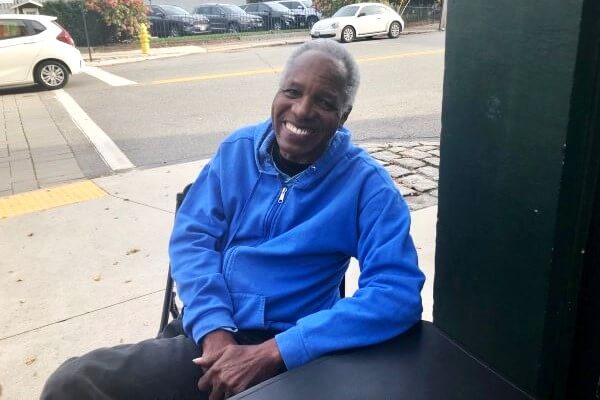Local Spotlight: Rodney Mashia
 |
|
Rodney sits during an interview outside Elements Cafe on Main Street, Biddeford. SBN STAFF/LIZ GOTTHELF
|
Sitting at an outside café table in downtown Biddeford recently, Rodney Mashia recalled how nine years ago, when he first moved to Biddeford, he was often the only Black person at a local restaurant or beach.
“My partner and I, we used to play this game, I called it “Count the Black people,” he said. These days, he said the city has become more diverse, and he doesn’t have to play that game anymore.
“A lot of the stuff that people see as history now, sitting in the back of the bus, drinking from the “Colored” water fountain – I actually did that. It was part of my everyday experience. I can’t say I didn’t think about it, but that was just how things were,” said Mashia.
Mashia, 73, is a musician and a retired engineer and computer programmer. After graduating college in Boston, he spent his adult life in various places in New England, but he grew up in Louisiana, in a town called Norco, “about 20 miles upriver from New Orleans.” The town derived its name from an acronym for the New Orleans Refining Company which industrialized the area.
He grew up in the Black section of town, across the street from a chemical plant and four blocks away from an oil refinery.
“The pollution was so bad that people were dying of cancer The town was very segregated. The Black people wanted something done about it but the white people did not because it was their livelihood. At this point, it was back in the 50’s and they didn’t hire Black people then,” he said.
His family did not escape the curse of cancer that plagued the side of town where he grew up. Mashia is a prostate cancer survivor, a brother of his has lung cancer, and his mother died of liver cancer.
Mashia grew up in a close-knit community surrounded by family and long-time friends. Most of his childhood, he attended all-Black schools. When he was a junior in high school, the town began desegregating schools, and he was one of three students in his grade level to leave the all-Black high school that was a block and a half from his home and ride five miles on a school bus to a formerly all-white high school.
He was an avid reader, a good student, and eager to learn, and he found teachers in both school systems to be equally dedicated, though the school system he was transferred to had better facilities and he didn’t have to use hand-me-down textbooks like he did in the Black schools.
“I went from being an honor student at the Black school to being an honor student at the white school,” he said. At the white high school, he received a college scholarship that was not offered at the Black high school.
“The vast majority of the kids just sort of ignored me. I found out later they had a series of meetings to prepare for the coming of the Black kids. There was a small minority of kids who gave me a hard time, but it didn’t take me too long to figure out that the kids who were giving me a hard time were the kids who, before we got there, were considered the ‘losers,’ in the high school hierarchy, and they thought they found someone lower than them. That didn’t last very long because they didn’t get any reaction and they weren’t really being supported by the other students,” said Mashia.
He quickly found his niche.
“My biggest support was the band room. The band members supported me 200 percent. I still have friends from that group,” he said.
Music has been a big part of Mashia’s life. His first audience was at church, where there was always music, and he sang and played guitar.
“I lived in a time and era where going to church was not an option – you had to go. The church was literally in our back yard,” he said.
As a boy, he picked up his brother’s guitar and taught himself. At first, he wasn’t the best player, but after some self-study he was able to hone his skill.
“When I started playing, I didn’t even know how to tune it,” he said. “Eventually I found one of those Mel Bay instruction books.”
Mashia has performed for several years as a solo artist. He said prior to Covid, he played in a lot of bars and restaurants. When the pandemic forced him to take a break and pause, he realized he no longer was interested in playing what he calls “eating and drinking music.”
“When you play in a bar, you have to play something people know. They’re not really paying attention, they’re not there to see you, they are there to eat, talk and get a drink. And I don’t want to do that anymore,” he said.
While Mashia doesn’t do the bar scene anymore, he still plays at benefits and other functions, including the recent SURJ rally in Biddeford.
He writes much of the music he plays, and also puts his own style on covers of his favorite songs, including “Woodstock,” and “Angel from Montgomery.”
He refers to his music as “music from the heart,” and draws from his own life when penning lyrics.
“It’s love, it’s how I express love. It keeps me reasonably sane,” he said. "I feel like I have something to offer, in terms of my background and experience.”
Mashia recently formed a band, The Rodney Mashia Project, where he sings and plays guitar and flute. The Rodney Mashia Project is scheduled to play from 8-10 p.m., Nov. 18 at Flourish Arts and Healing, 140 Main St., Biddeford.
Publisher Liz Gotthelf can be reached at newsdesk@sacobaynews.com.

